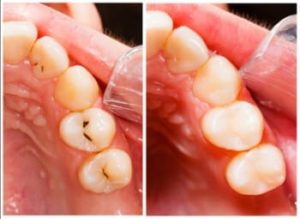 A cavity is really the product of a perfect storm involving bacteria, food, saliva and the resulting acid. Bacteria in your mouth combine with food that sits on your teeth and creates plaque which includes acid. The acid in the plaque eats holes in your tooth (tooth decay) called cavities.
A cavity is really the product of a perfect storm involving bacteria, food, saliva and the resulting acid. Bacteria in your mouth combine with food that sits on your teeth and creates plaque which includes acid. The acid in the plaque eats holes in your tooth (tooth decay) called cavities.
So how can you prevent those pesky little holes in your molars—and canines, incisors and premolars? Use these five preventative measures to keep that tooth decay, and those nasty cavities at bay:
Brush regularly (and well). In an ideal world, brushing regularly would mean after every meal, but we know that’s not always possible. If you can’t do that, brush your teeth twice a day (usually in the morning and at night). It’s especially important to make sure you brush before sleeping so the food particles are not sitting in your mouth overnight. When you do brush, make sure you avoid these common brushing mistakes for optimum results (and a healthy mouth).
Don’t forget to floss. Flossing gets all the plaque and harmful bacteria that you didn’t get while brushing, making it one of the most important daily habits you can do that prevent cavities and tooth decay. It doesn’t matter if you floss before or after brushing, as long as you do it. So grab that dental floss and gently maneuver it between your teeth; you’ll be glad you did when you get a clean bill of oral health at your next dentist’s appointment.
Restrict your soda intake. Scientific studies have shown a strong connection between soda consumption and tooth decay, and it’s not surprising. Sodas, even diet sodas, contain sugar which can mingle with bacteria in your mouth to form the acid that causes tooth decay and cavities. So limit your soda intake for a healthier mouth. If you do have a soda, drink it with a straw. Drink water after soda (or instead of soda), and swish in your mouth to reduce the amount of sugar on your teeth. Try to avoid soda before sleeping and avoid sipping a soda for long periods of time; these two habits cause the sugar to sit on your teeth for extended periods of time, creating a ripe atmosphere for tooth decay.
Ask your dentist if sealants are right for you. Your teeth have deep grooves and indentations where bacteria, plaque and food particles can hide, making them very hard to reach with normal brushing and flossing. Dental sealants are painted on to your teeth, forming a barricade against unwanted invaders. Your dentist may recommend this for you as a child or as an adult. The actual application of the dental sealants doesn’t take very long but the benefits are definitely long-term.
Get the hard-to-reach stuff cleaned off your teeth regularly. Regular dental cleanings and exams are the crux of preventing cavities and keeping your tooth decay in check. Schedule an appointment with your dentist to find out which kind of dental cleaning keeps your mouth in the best condition and rids your teeth and gums of hard-to-reach plaque that causes cavities.





